From 2015 to 2017, World Education Nepal partnered with the World Food Programme
(WFP) to improve reading outcomes among Grade 1–Grade 3 students in 1,040 schools in six Far Western and Mid-Western food insecure districts that have generally poor educational outcomes. Results from the 2017 Early Grade Reading Assessment (EGRA) indicate that the collaborative effort to improve students’ ability to learn by addressing nutrition while simultaneously improving the quality of instruction has led to impressive results with a high return on investment: At baseline, only 1% of Grade 3 students could read at grade level; after two years, a majority of students can. This brief provides an overview of the project interventions and results.
View it here.
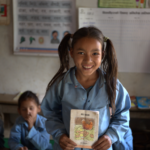
World Education is committed to improving the quality of early grade education in districts with poor educational outcomes. Under the Equity in Education in Disadvantaged Districts project funded by UNICEF, World Education implements programming to improve early grade reading and math achievement in four disadvantaged districts in Mid- and Far-Western Nepal: Achham, Bajura, Kalikot, and Mugu.
At the end of 2017, after only one year of programming, the project is showing impressive results, with students in intervention schools demonstrating greater learning gains than those in control schools. For more on the progress we’ve seen in Year 1, read our full summary brief:
UNICEF Early Grade Learning Year 1 Results Brief – April 2018
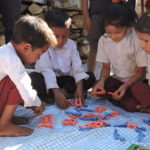
In November 2016, Handicap International and Resource Center for Rehabilitation and Development, with support from World Education Nepal and UNICEF, initiated a pilot screening program to support and inform the Government of Nepal’s efforts to identify, diagnose and treat functional impairments among children early in their development. Through the pilot, World Education seeks to expand efforts to support children with functional limitations or disabilities in meeting Early Grade Learning outcomes and to improve learning outcomes for children with functional limitations by promoting responsive instructional strategies.
The pilot screening surveyed a sample of 2,804 children enrolled in ECD-Grade 3 classes in 40 public schools across Achham, Bajura, Kalikot, and Mugu. Initial findings indicate that 26% of screened children are at risk of limited participation in society because of one or more functional limitations and that 9.4% of screened children have a 99-100% chance of being formally diagnosed with a disability. These results suggest that disability prevalence in Nepal may be higher than suggested by the Government of Nepal’s 2011 Census, which indicated that 1.94% of Nepalis have some form of disability, a statistic that falls below World Health Organization-reported international averages. The overview, linked below, shares strategies, results and recommendations from the pilot, which is one component of a broader Equity in Education program supported by UNICEF.
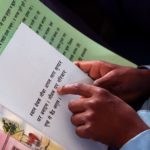
Since 2015, World Education Nepal has partnered with the World Food Programme to improve learning outcomes among Grade 1-Grade 3 students in 1,040 schools in six Far-Western and Mid-Western food insecure districts where the World Food Programme distributes student meals. In early November 2017, World Education Nepal published a final report detailing results from 2017 Early Grade Reading Assessments in Baitadi, Bajhang, Dadeldhura, Dailekh, Darchula and Jajarkot, which generally have poor educational outcomes.
Results from the 2017 Early Grade Reading Assessment indicate that World Education and the World Food Programme’s collaborative effort to improve students’ ability to learn by addressing nutrition while simultaneously improving the quality of instruction has led to impressive results, with a high return on investment: At baseline, only 1% of Grade 3 students could read at grade level; after two years, a majority of students can. For complete results, please access the full 2017 report:
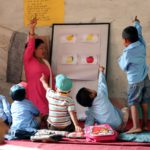
World Education Nepal produced a series of technical briefs to share key strategies, results and lessons learned from various aspects of the Sangai Sikaun, Sangai Badhaun (Learning & Growing Together) project. The first phase of Sangai Sikaun, Sangai Badhaun worked in severely disadvantaged communities with poor educational outcomes from 2012 t0 2016 and aimed to build a holistic education model in Nepal that enables marginalized children to complete a quality education up to Grade 8. In pursuit of this, the project focused on increasing access to and participation in quality Early Childhood Development classes; improving early grade reading and numeracy skills; improving subject teaching and student persistence in Grades 4-8; and, improving parents’ abilities to support their children’s learning.
At project conclusion, activities had improved learning outcomes for 13,000 students enrolled in Early Child Development to Grade 10 classes in 27 community schools, across three Village Development Committees in Banke and Dang districts. Dropout rates fell dramatically and attendance increased. Each technical brief in this series highlights strategies, results and lessons learned from a different area of the Sangai Sikaun, Sangai Badhaun project’s first phase. Collectively, these contributions add to a growing evidence of approaches that should shape policies that will change outcomes for Nepal’s least advantaged children. We look forward to expanding upon the learnings reported on our technical brief series in phase two of the Sangai Sikaun, Sangai Badhaun project.
Sangai Sikaun, Sangai Badhaun (Phase One) Technical Brief Series:
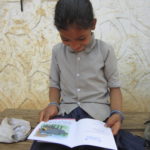
In Nepal, teaching and learning reading in the early grades remains a significant challenge,with most primary school students unable to read at grade level. Although enrollment in public schools is high, drop-out and grade repetition are common-place. Teachers often resort to rote instruction methods, resulting in memorization rather than actual reading. World Education and its partners are working to strengthen early grade reading in the weakest public schools through learning assessments, teacher training, and the introduction of grade-appropriate reading materials and activities for early learners.
